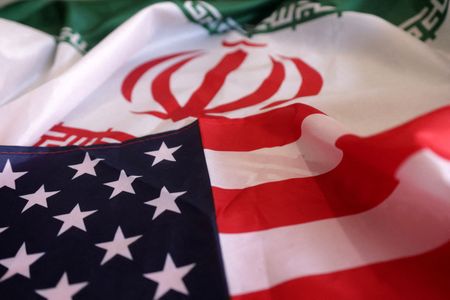By Humeyra Pamuk and Daphne Psaledakis
WASHINGTON (Reuters) -The Biden administration levied sanctions on Thursday on prominent Turkish businessman Sitki Ayan and his network of firms, accusing him of acting as a facilitator for oil sales and money laundering on behalf of Iran’s Revolutionary Guard Corps.
The U.S. measures come at a time of strained ties between the two nations over a host of issues, including disagreement over Syria policy and Ankara’s purchase of Russian air defense systems.
Ayan’s companies have set up international sales contracts for Iranian oil, arranged shipments and helped launder the proceeds and obscured the origin of the Iranian oil on behalf of Iran’s Quds Force, an arm of the IRGC, the Treasury said in a statement first reported by Reuters.
“Ayan has established business contracts to sell Iranian oil worth hundreds of millions of dollars to buyers,” in China, Europe and the United Arab Emirates, it said, adding that he then funneled the proceeds back to the Quds Force.
Ayan’s son Bahaddin Ayan, his associate Kasim Oztas and two other Turkish citizens involved in his business network are also designated, along with 26 companies, including his ASB Group, a Gibraltar-based holding company and a vessel.
In an emailed response to a Reuters’ request for comment, Sitki Ayan said, “We will defend our legal rights against everyone.”
He had been involved in two business activities with Iran, he added. These were trade of oil and petroleum products ended by sanctions in 2010, and the sale of Iranian electricity to Turkey from 2009 to 2015, which he quit over payment problems.
“I have never worked with anyone other than Iranian official government institutions in any period of my life,” he said.
Ayan’s son Bahaddin and Oztas were not immediately available for comment. Ayan’s ASB Group and Turkey’s communications directorate did not immediately respond to requests for comment.
The Treasury action freezes any U.S. assets of those designated and generally bars Americans from dealing with them. People engaging in certain transactions with those designated also risk sanctions.
Washington had most recently warned Turkey to refrain from a military incursion into northern Syria after Ankara said it was preparing a possible ground invasion against the Syrian Kurdish YPG militia it views as terrorists but who form the bulk of U.S.-backed Syrian Democratic Forces (SDF).
Washington maintains sweeping sanctions on Iran and has looked for ways to increase pressure as efforts to resurrect a 2015 nuclear deal with Tehran have stalled.
President Joe Biden had sought to negotiate Iran’s return of to the nuclear deal after former President Donald Trump pulled out of it in 2018.
The 2015 pact limited Iran’s uranium enrichment activity to make it harder for Tehran to develop nuclear arms in return for lifting international sanctions. Iran denies wanting to acquire nuclear weapons.
(Reporting by Humeyra Pamuk and Daphne Psaledakis; Additional reporting by Ezgi Erkoyun and Daren Butler; Editing by Howard Goller and Clarence Fernandez)

